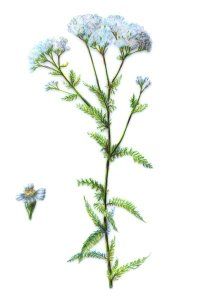In Homer's Iliad, legendary warrior Achilles uses yarrow to treat the wounds of his fallen comrades. Indeed, constituents in yarrow make it a fine herb for accelerating healing of cuts and bruises. The species name, millefolium, is Latin for "a thousand leaves," referring to the herb's fine feathery foliage.
Some people call it knight's milfoil, a reference to yarrow's ability to stop bleeding and promote healing of wounds. In fact, yarrow is often used in herbal remedies designed to treat heavy bleeding from menstrual periods, bleeding ulcers and more.
Advertisement
Uses for Yarrow
Yarrow has been credited by scientists with at least minor activity on nearly every organ in the body. Early Greeks used the herb to stop hemorrhages. Yarrow was mentioned in Gerard's herbal in 1597 and many herbals thereafter.
Yarrow was commonly used by Native American tribes for bleeding, wounds, and infections. It is used in Ayurvedic traditions, and traditional Chinese medicine credits yarrow with the ability to affect the spleen, liver, kidney, and bladder meridians, or energy channels, in the body.
Animal studies have supported the long-standing use of yarrow to cleanse wounds and to control bleeding of lacerations, puncture wounds, and abrasions. Yarrow may also be used in tea or tincture form for bleeding ulcers, heavy menstrual periods, uterine hemorrhage, blood in the urine, or bleeding from the bowels. Yarrow compresses are effective for treating bleeding hemorrhoids.
Yarrow is often classified as a uterine tonic. Several studies have shown that yarrow can improve uterine tone, which may increase menstrual blood flow when it is irregular or scanty, and reduce uterine spasms, which reduces heavy flow in cases of abnormally heavy menstrual flow.
In addition to its antispasmodic activity, the herb contains salicylic acid (a compound like the active ingredient in aspirin) and a volatile oil with anti-inflammatory properties, making it useful to relieve pain associated with gynecologic conditions, digestive disorders, and other conditions. Taken daily, yarrow preparations can relieve symptoms of menstrual cycle and uterine disorders, such as cramps and endometriosis.
Yarrow also has antiseptic action against bacteria. The bitter constituents and fatty acids in yarrow are credited with promoting bile flow from the gallbladder, an action known as a cholagogue effect. Free-flowing bile enhances digestion and elimination and helps prevent gallstone formation. Because of these anti-inflammatory, antispasmodic, and cholagogue actions, yarrow is useful for gallbladder complaints and is considered a digestive tonic.
Yarrow has a drying effect and can be used as a decongestant. Sinus infections and coughs with sputum production may be improved by yarrow, especially when mixed with equal parts goldenseal. Note that a cough with ample sputum production may be a sign of bronchitis or pneumonia and requires the attention of a physician.
Yarrow's astringent action is helpful in some cases of allergy, in which watery eyes and nasal secretions are triggered by pollen, dust, molds, and animal dander. Yarrow also has long been used to promote sweating in cases of colds, flu, and fevers, thus helping you get over simple infections.
In the next section, you will learn how to prepare yarrow for herbal remedies and some of the potentially dangerous side effects.
To learn more about treating common medical conditions at home, try the following links:
- For an overview of all of our herbal remedies, go to the main Herbal Remedies page.
- To learn more about treating medical conditions at home, visit our main Home Remedies page.
- One of the best things you can do for your health and well being is to make sure you are getting enough of the vital nutrients your body needs. Visit our Vitamins page to learn more.
This information is solely for informational purposes. IT IS NOT INTENDED TO PROVIDE MEDICAL ADVICE. Neither the Editors of Consumer Guide (R), Publications International, Ltd., the author nor publisher take responsibility for any possible consequences from any treatment, procedure, exercise, dietary modification, action or application of medication which results from reading or following the information contained in this information. The publication of this information does not constitute the practice of medicine, and this information does not replace the advice of your physician or other health care provider. Before undertaking any course of treatment, the reader must seek the advice of their physician or other health care provider.Before engaging in any complementary medical technique, including the use of natural or herbal remedies, you should be aware that many of these techniques have not been evaluated in scientific studies. Use of these remedies in connection with over the counter or prescription medications can cause severe adverse reactions. Often, only limited information is available about their safety and effectiveness. Each state and each discipline has its own rules about whether practitioners are required to be professionally licensed. If you plan to visit a practitioner, it is recommended that you choose one who is licensed by a recognized national organization and who abides by the organization's standards. It is always best to speak with your primary health care provider before starting any new therapeutic technique.
Advertisement
